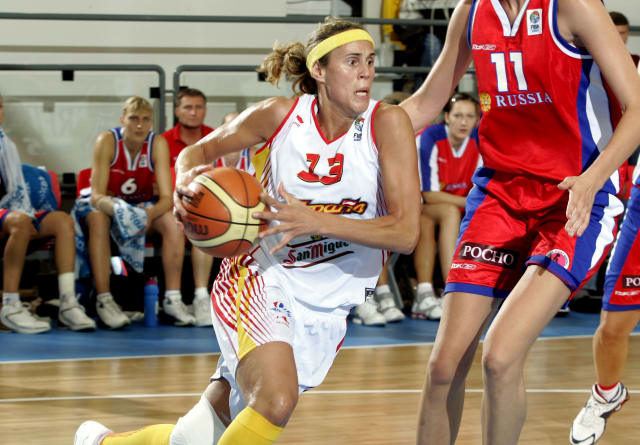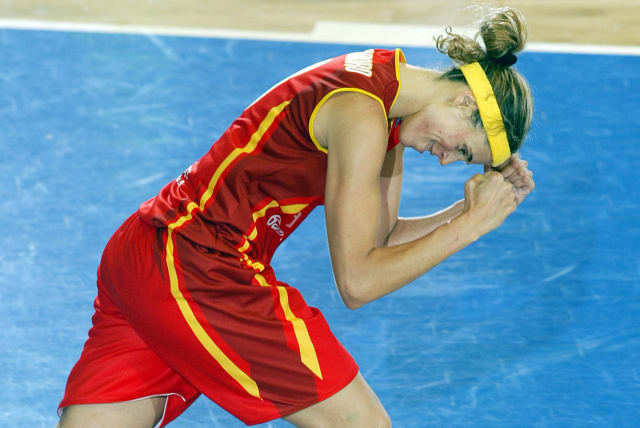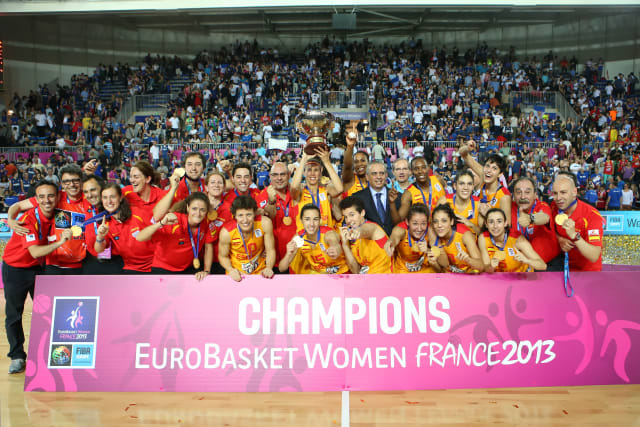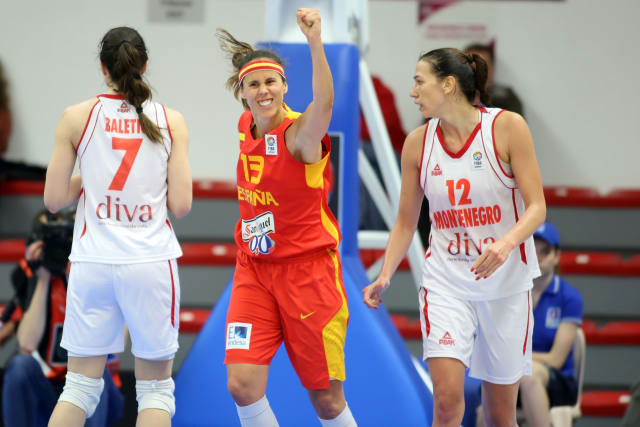FIBA Women's EuroBasket Legends: Special times for Spanish legend Valdemoro
MADRID (Spain) - One of the great European players and a legend of Spanish basketball, Amaya Valdemoro competed in an amazing seven editions of the FIBA Women's EuroBasket.
MADRID (Spain) - One of the great European players and a legend of Spanish basketball, Amaya Valdemoro competed in an amazing seven editions of the FIBA Women's EuroBasket.
It was the backbone of an international career which also witnessed her appear four times at the FIBA Women's Basketball World Cup, as well as becoming a double Olympian. FIBA.basketball caught up with the former star to find out more about her various outings at the FIBA Women's EuroBasket.

Let's go back to your first in 1995. You're basically a teenager and it's your first major tournament. What do you remember about it, especially the emotions, the fears, the hopes and the locker room?
For me, going to the national team was a dream come true and Spain had won the gold at the FIBA Women's EuroBasket two years earlier. But at my first tournament, everything went wrong because we lost the Quarter-Final and Ukraine won the title. However, just to be there with all those great players was amazing. I remember watching how Judith Balogh of Hungary was an amazing scorer, along with others like Eva Nemcova (CZE), Andrea Kuklova (SVK), Zana Lelas (CRO) and Maryna Tkachenko (UKR). I realized how big basketball could be.
I had a tough experience because we had injuries and I was trying to help the team, but I didn't play a lot of minutes. When you arrive, you expect everything and I thought I was going to play more. But when you get to the senior team, everything is different and it had a big impact on me. Still, I had the opportunity and a chance in my career to live the good and bad moments. If you look back to then, Spain wasn't a leading nation in women's basketball like it is now.
1995 was a big tournament to help me improve my game. Today, people have role models and they are easy to follow on social media. But back then, the only chance you really had to see them was live. Women's sport was not as big - or at least like it is now. I am telling you, Balogh was a killer and when I saw her and all of these other names I mentioned, I sat with my mouth open all of the time because they were just so great.

I had some fears of course. When you are young, you have fears about doing something wrong. But it is important that you learn. The team around you is very important because they must tell you how to improve, what you can do and what you can't do. I always say it is about how hard you practice, how you make corrections given to you by coaches and your teammates.
Also it is important to be part of the team off the court, because the better the communication in this respect, the better the team. I am very grateful to the likes of Monica Messa, Pilar Valero, Carolina Mujica and Paloma Sanchez because they were amazing teammates and I am always thankful to have been with them because they taught me a lot of things. I even have contact with them now. One of the things that was really hard was when we lost the Quarter-Finals, we had to wait for after the Final to fly back to Spain. I remember my roommate was Paloma and she was so embarrassed that we had lost, she left the room. When you are young, you feel bad if you lose, but it wasn't until I was older that I truly understood how she had been feeling at that time.
In 2007 you had the ultimate 'bittersweet' tournament. You won the MVP award but Spain could not take the gold. Was it your best individual tournament?
It was amazing in Italy and I thought we could have won the tournament. Still today in my head, I see a lay-up I had to tie the Final after we had almost come from 22 points behind. Our roster didn't have the physicality that Spain has now, Our post players were little and our tallest wing was 1.82. But, we loved the competition and we never gave up. We had an amazing tournament and I really believed we deserved to win it. Russia was not the Russia team of today - they had many amazing players like Maria Stepanova, Svetlana Abrosimova and Olga Arteshina. Also in this same year, the men lost by two points against Russia in the Final in Spain to also get the silver medal.
I am always thankful for the tournaments that I played because we always gave 100 percent. Also when I look back, I don't actually think 2007 was even my best tournament. I think that was during 2005 in Turkey, when I showed my very best performance and basketball at a Final Round.
Then during 2013 in France, it was the perfect goodbye with a gold medal.
It was a dream come true. I don't think there was a better way to finish my career. It was also a really weird tournament because my body was broken. I had fractured my wrist and had many problems with my calf. I had a different role playing with all those amazing players like Alba Torrens, Silvia Dominguez, Marta Xargay and Sancho Lyttle. I tried to take the pressure off them and played a lot of my minutes in the four position, since I also didn't have the same speed as before. It was actually an up and down time for me. Sometimes I was crying in the hotel and scared about my future, sometimes I was happy and making jokes with everyone. If I look back, I see myself with a lot of responsibility in all these tournaments, with a lot of stress and always being hard on myself. In this last tournament I was 20 kilos less because I was trying to live the moment and enjoy it as much as I could - and I did.

I am thankful for this retirement as the last thing I did in my career was to pick up the trophy and lift it into the air. Returning with the gold medal was special because when I started playing with the national team, we always fell in the Quarter-Finals and we were also a little scared about Russia, the Czech Republic or Yugoslavia for example. We were a nation trying to get to a certain level. Then when I left 20 years later, we had started to dominate women's basketball. I look back and think how much women's basketball has changed in Spain and how important all the stuff we did actually is. My first Final Round podium was 2003 in France and apart from Poland in 2011, we were always getting medals.
How does the FIBA Women's EuroBasket compare to other big tournaments?
I think it is even more difficult than the FIBA Women's Basketball World Cup or even the Olympics, because it is such a good level of competition. In one year, a nation can do great and then two years later, they might not even be at Final Round. It is really a super level. I know around the world the quality is improving everywhere, but for me, the European level is amazing . You never know what is going to happen and you always have four or five teams who could win it, so anything is possible. That is the secret and this competition is helping the growth of women's basketball.

What do you miss most about being an active player?
I miss living those moments with the team. That feeling in your stomach when you are taking to the court. When I was on the court, I felt special. As an athlete you know what kind of life you are choosing, that your career is short and that you are not a lawyer or something like this. You know it will only be for a short period of your life. But we are extremely fortunate to live in those moments that sport gave to us. Not anybody can live our life and be a basketball player in professional sport. I think about the moments I miss from when we we there standing for our national anthem, the special chemistry with the team. How I used to feel when I scored, or even when I missed, because that always drove me one step more to improve. So when I then went and scored the winning basket, I could think about all that hard work that I did to become the person who was ready to take that important shot.
Finally, tell us about 2021. Spain is set to host the event with France. What are your expectations?
It's going to be an amazing tournament since France and Spain are dominating European basketball and are always the top teams. Spain especially, because everyone now always talks about them being contenders at the Olympics and at the FIBA Women's Basketball World Cup - not only in Europe. Next year will be special because we have the tournament starting in June and afterwards, it is the Olympics. As co-hosts of the FIBA Women's EuroBasket, Spain will need to be ready because the expectations will be for them to be back for another Final. They still have the roster to be able to win it and I will be in the stands cheering and supporting my team as I always do because I am so proud of Spanish basketball.
FIBA